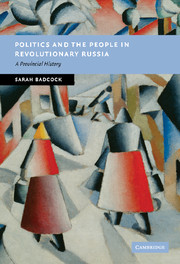Book contents
- Frontmatter
- Contents
- List of figures and table
- Notes on the text
- Acknowledgements
- Maps
- 1 Introduction
- 2 The February revolution: whose story to believe?
- 3 The Socialist Revolutionary Party and the place of party politics
- 4 Choosing local leaders
- 5 Talking to the people and shaping revolution
- 6 Soldiers and their wives
- 7 ‘Water is yours, light is yours, the land is yours, the wood is yours’
- 8 Feeding Russia
- Conclusions
- Bibliography
- Index
- NEW STUDIES IN EUROPEAN HISTORY
Conclusions
Published online by Cambridge University Press: 10 August 2009
- Frontmatter
- Contents
- List of figures and table
- Notes on the text
- Acknowledgements
- Maps
- 1 Introduction
- 2 The February revolution: whose story to believe?
- 3 The Socialist Revolutionary Party and the place of party politics
- 4 Choosing local leaders
- 5 Talking to the people and shaping revolution
- 6 Soldiers and their wives
- 7 ‘Water is yours, light is yours, the land is yours, the wood is yours’
- 8 Feeding Russia
- Conclusions
- Bibliography
- Index
- NEW STUDIES IN EUROPEAN HISTORY
Summary
These chapters are intended to highlight the confusion and imprecision of power relations and social interactions in 1917 rather than to offer conclusive answers and clear models. Russia's revolutionary year generated multiple sources of power, with non-institutional, decentralised power challenging state and central power. Local considerations defined regional power relations. Authorities, be they central, regional or party political, struggled and ultimately failed to define revolutionary discourse, communicate their messages and control political power. Recognising the blurred lines and ambiguity of locations of power helps us move towards a more nuanced understanding of 1917 and demonstrates that the political elite's alternatives were circumscribed by the desires and demands of ordinary people. Historians face serious problems in trying to ‘hear the voices’ of ordinary people, and of ordinary rural people in particular, as this work tries to do. Despite all efforts, ordinary people's voices remain elusive, and muffled by the voices of the political elite and politically dominant social groups. The best we can do is to be conscious of the diversity and confusion of ordinary people's responses to revolution, and to try and pick up on the myriad of different perspectives held by ordinary people in 1917.
This study highlights areas that help us to understand the failure of democratic party politics in 1917.
- Type
- Chapter
- Information
- Politics and the People in Revolutionary RussiaA Provincial History, pp. 238 - 243Publisher: Cambridge University PressPrint publication year: 2007



